Internships
Internship informational planning monthly meeting dates
Attendance at one of the informational meetings is a required prerequisite for internship placements. If you are interested in earning an internship, you must attend one of the monthly internship information sessions before you apply. These sessions will be held via zoom in Spring 2026:
Spring 2026 Internship info meetings
Monday 2/9 at 4:30pm
Tuesday 3/3 at 10am
Wednesday 4/22 at 12noon
Thursday 5/30 at 2pm
Zoom: https://charlotte-edu.zoom.us/j/93388483101
Eligibility Requirements
To apply for a criminal justice & criminology internship and to enroll in the internship class, students must:
- be an enrolled Criminal Justice & Criminology Master’s student, OR
- be a declared Criminal Justice & Criminology major (CJ&C minors are NOT eligible for internships);
- be a Junior/ Senior with at least 60+ completed credit hours;
- have at least a 2.5 overall GPA (minimum requirement);
- have completed CJUS 1511 (Introduction to Criminal Justice or Foundations of Criminal Justice), and CJUS 2340 (Criminological Theory) with a minimum grade of a “C” in each class; and
- attend an Internship Informational Meeting (schedule above and also listed on the CJ&C home page) to learn about the process and understand when and how to apply for a CJ & C internship.
Academic Credit Hour Options
120 field hours, 3 credit hours = 8 hours per week for 15 weeks (12 hours a week for 10 weeks in the summer)
240 field hours, 6 credit hours= 16 hours per week for 15 weeks (24 hours a week for 10 weeks in the summer)
When are Internships available?
Internships can be scheduled for Fall, Spring or Summer semesters. However, students need to apply for internships at least one or two semesters before receiving a placement. Please note that federal agencies often prefer that students apply 6 months before being considered for an internship; 3 months for state or local internship is usually sufficient. Further, many federal agencies only list their internship opportunities on www.usajobs.gov.
Where can students earn Internship credits?
Many different local, state, federal and private criminal justice agencies are available for consideration for an internship placement. These options include law enforcement agencies/departments, community correctional agencies, probation departments, juvenile justice agencies, public defender’s offices, private attorneys, victim and social service agencies, and private security, as examples.
Potential Employment Opportunities
Click here for a list of potential internship placements
and here: https://www.ncdps.gov/
and here: Mecklenburg County, North Carolina Jobs from Worklooker
and here: https://www.usajobs.gov
Note… these opportunities quickly change, so check back often.
** Criminal justice agencies can learn more about the program by reading the Agency_internship_2025 document. If you want your agency to be added to our list of potential internship placements, please email the Internship Coordinator (contact information is below).
Internship Application Process – Next Steps
- Students who are interested in securing an internship must attend an Internship informational meeting, and then submit a completed application. Per the application requirements, after attending the meeting, students need to email the Internship Coordinator (email address is below) one complete PDF document which includes the following four documents:
- Fill out completed application after attending internship information meeting;
- a written personal statement/cover letter (see help here – https://zety.com/blog/how-to-write-a-cover-letter);
- your resume (help on building a resume); and
- an unofficial Banner transcript – How to request UNC Charlotte transcripts.
- Some placements (e.g., NCSBI) require you to get your application materials notarized. You can go wherever you wish, however, see notary campus information: https://legal.charlotte.edu/legal-services/notaries-public-campus
- Please name the PDF file as follows – “your last name_application” (example – Smith_application.pdf).
- After the Internship Coordinator confirms that you attended an informational meeting and that you meet eligibility requirements, your submitted application will be reviewed and hopefully approved by the Internship Coordinator.
- The Internship Coordinator will then forward your internship packet (the complete PDF document) to the three agencies of your choice as indicated on the application. If your skillset is commensurate with the agency’s needs, they may contact you for an interview (How To Prepare for an Interview). As the agency has final discretion on who they ultimately hire, the Department of Criminal Justice & Criminology cannot guarantee any student that they will secure an internship placement in any given semester. Thus, it may be in your best interest to over-register for courses during the semester you are hoping to secure an internship placement. In the event that you do secure a placement, you can then drop one of your other preregistered classes.
- If an agency approves your internship following an interview, the Internship Supervisor in the agency must confirm the internship placement with the Internship Coordinator by email. Once an agency confirms your internship placement with the Internship Coordinator (via email), the Internship Coordinator will then issue a permit for you to register for 3 or 6 internship credits (as indicated in your application). You can then register for the internship credits and class.
To be clear, students can ONLY register for the internship class and credits after they have met all eligibiliy requirements, submitted the completed application and had it approved, interviewed at one or more agencies, and are placed as an intern at a criminal justice agency (which must be confirmed via email with the Internship Coordinator).
Internship Class Requirements
In addition to completing your internship hours, the internship class will meet regularly throughout the semester. The scheduled classes will be available to students in the course syllabus in Canvas after they enroll in the class.
Students must create an original research project about their internship placement. The research project will be fully developed in a printed poster format (see examples below). The student will present their research project to the entire Internship class at the end of the semester.
To get you started, there are lots of videos that provide advice on creating an effective poster and presentation. Here is a link on poster design; a tutorial on PowerPoint, and some tips on presenting.
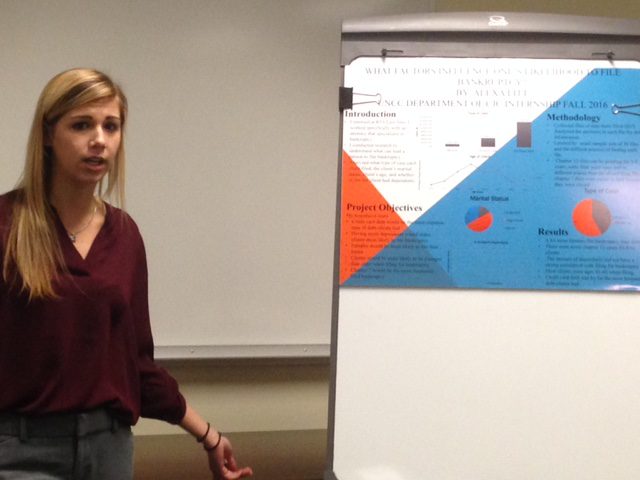
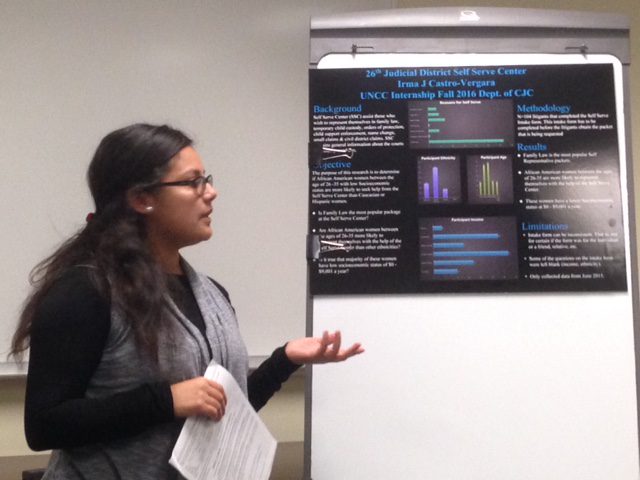
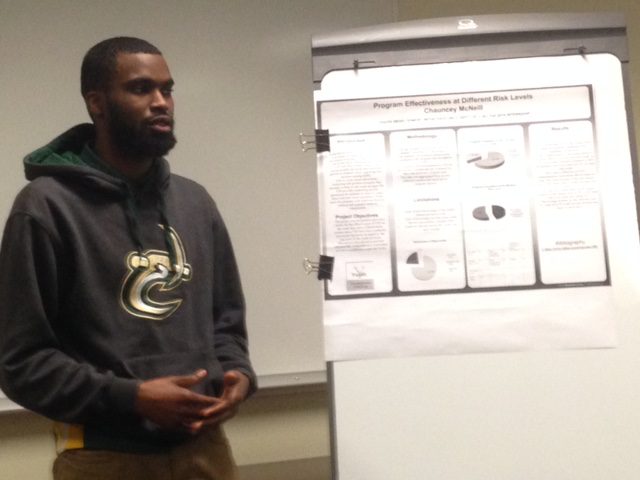

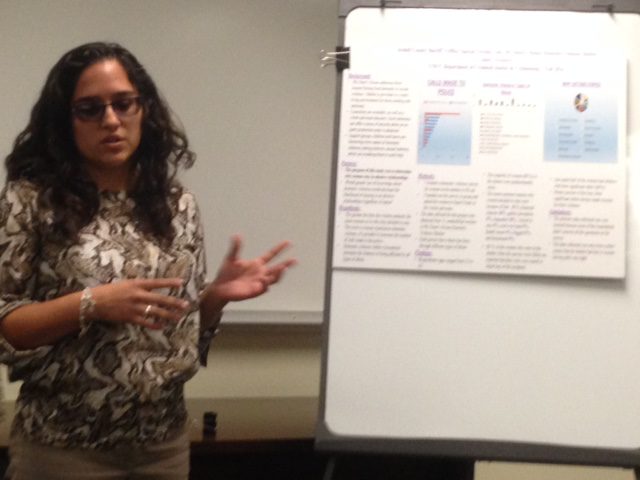

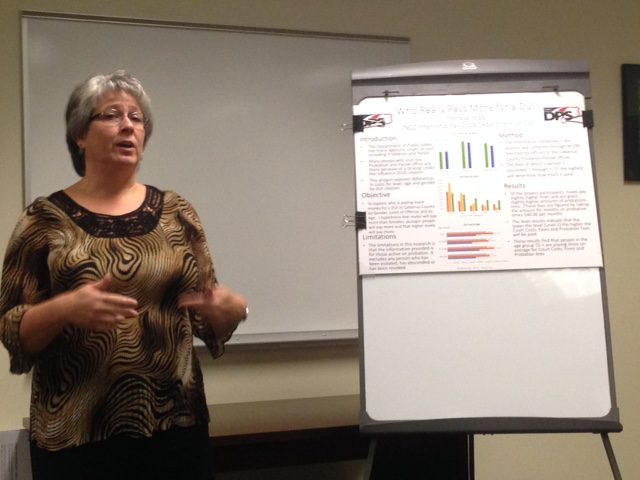
Why should you consider a CJS internship?
- To gain experience: During internship placement you often get to see and experience the different roles that people do within certain agencies. This is good to take into the professional world with you because at times, you may be asked to do various tasks involving different elements of the company.
- To have a better understanding: An internship allows you to take time to understand your role, tasks and the CJS. Write things down, ask questions and do things repeatedly to make sure you are doing everything with 100% effort.
- Have the opportunity to learn and watch: You can learn from the best during an internship. Perhaps you will learn new skills from your assigned supervisor or new things about the CJS. Communication and interaction is key so ask plenty of questions and look at everyone you meet as a networking opportunity.
- Build confidence: Whether it be public speaking, giving presentations or simply suggesting new ideas, internships will build your confidence which allows you to grow as both a worker and a person. Confidence is key because if you don’t believe in yourself…who will? There is a fine line between confidence and arrogance, so make sure you don’t cross it because no one likes an arrogant worker! Internships will help you to build confidence through practice which will also help in your personal growth.
- To communicate: Internships often require you to both work individually and within a team. You learn to communicate in new ways to build professional working relationships with people of all ages. This is great because it allows you to be open to other people’s ideas and to get creative in a team in order to build better ideas and ultimately, to build a better company.
FAQ
What if I have my own internship set up?
Students can set up their own internships. However, the CJ&C Internship Coordinator will not provide a reference letter for internships that are not set up through our process, for internships that are not for UNC Charlotte credit, or for students who have not met all eligibility criteria. If you want UNC Charlotte credit for your internship, you will need to follow the process described above and have your internship placement approved by the Internship Coordinator.
Can I get paid for my Internship work?
Yes. Students can receive credit for paid internships provided ONE of the following criteria are met:
- the internship is a different position than the student’s current paid employment
- the internship is the same position as a student’s current paid employment BUT the students work additional hours separate from their regularly scheduled hours AND reports to a different supervisor for these additional hours
Who makes the final decision on whether I earn an internship placement?
The agency/community representative decides which interns they will select. Therefore, it is advisable for students to over-register for courses during the semester you wish to obtain an internship. If you are selected for an internship during that semester, you can drop a course (or courses) of your choosing, if needed. Again, the department cannot guarantee an internship placement in any given semester.
What is the course grading scale?
A letter grade of A-F will be assigned according to specific course criteria.
What should I do to prepare for an internship interview?
See information on suggested skills:
- https://www.goodwin.edu/enews/criminal-justice-skills/
- https://ca.indeed.com/career-advice/finding-a-job/probation-officers-skills
- https://www.goodwin.edu/enews/law-enforcement-skills/
- https://www.centreforsecurity.com/11-skills-of-an-effective-private-investigator/
See below for some information/guidelines on What To Do When You Get an Interview.
- Tips for how to conduct a proper handshake
- During the interview
- What not to do in an interview
- How to get hired in Criminal Justice and Criminology Careers
- 34 Crucial Tips for Your Next Job Interview [infographic]
- **Will an internship help me get a job later? – Importance of Attributes in Evaluating Graduates for Hire [infographic]
Things to remember prior to an Interview
- Always research the agency ahead of time (you look informed)
- Prepare to ask questions (you look engaged)
- Think about what skills/strengths you could bring to the internship placement (you look prepared)
- Be ready to explain why this opportunity is meaningful for your career aspirations (you demonstrate the ability to plan ahead)
- ALWAYS write a thank you note within 24 hours to the person who interviewed you (you appear professional)
- NEVER be late for the meeting (or you will appear to be unprofessional…)
For more information, contact Dr. Jen Hartman (Internship Coordinator):
Jennifer Hartman, Ph.D.
Associate Professor
Colvard 5073
jhartman@charlotte.edu